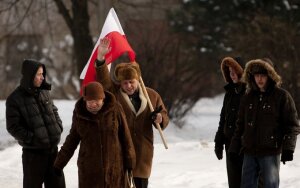- November 20, 2012
- 463
The majority of Poles in Lithuania think and pray in Polish

The majority of Poles in Lithuania speak, think, and pray in Polish. However, according to the data presented by Kinga Geben PhD during the international conference “Language, environment, and identity” („Kalba, erdvė ir tapatybė“), in local families of Polish origin there is a noticeable tendency to use Polish to a lesser and lesser degree.
“77 percent of the interviewed Lithuanian Poles regard Polish as their mother tongue, 22 percent of our interviewees claim that their mother tongue is Russian, and for 11 percent the first language is Lithuanian. The largest proportion of those who declare Polish as their native language live in Vilnius, Ejszyszki (Eišiškės), Landwarów (Lentvaris), and Nowe Święciany (Švenčionėliai). As regards Święciany (Švenčionys), Grygiszki (Grigiškės), and Soleczniki (Šalčininkai), the majority of local Poles view Russian as their mother tongue,” says Kinga Geben PhD.
The researcher stresses that the perception of a given language as one’s mother tongue depends on the environment in which the interviewee lives. In towns with a large percentage of Polish inhabitants, such as Ejszyszki (Eišiškės), a lot of people declare that their native language is Polish. However, in Russian- or Lithuanian-speaking environments the number of Poles who view Polish as their mother tongue decreases. In such communities there is a tendency to mention Russian or Lithuanian as the first language. Also, in some cases people state that they actually have two mother tongues.
“As far as the language of thought is concerned, the majority of our respondents think in Polish, although a noticeable number of the interviewees are also able to think in more than one language. The reasons for declaring Polish as one’s mother tongue are mostly connected with tradition, the heritage of the forefathers, and prayer. 85 percent of Lithuanian Poles pray in Polish. As regards the language of writing, it is usually related to the language of one’s school instruction. About 60 percent of the respondents say that they write in Polish on a regular basis,” emphasizes Geben.
Nonetheless, research conducted by Kinga Geben makes clear that the frequency of using Lithuanian as the language of communication within the interviewees’ families is rising, whereas the frequency of speaking Russian within the families of Lithuanian Poles remains more or less stable. There is also a visible decrease in using Polish within the families of the respondents.
“When asked about the most needful language, 61 percent of the people interviewed mention Lithuanian. English appears most needful to 44 percent of the respondents, while 35 percent of the interviewees opt for Russian,” states Geben.
To summarize her presentation, the researcher stressed that for the interviewed sample of Poles the most needful language is Lithuanian, the most prestigious tongue is English, and the most beautiful of all languages is Polish.
According to the Lithuanian Department of Statistics, in 2011 in Lithuania there were 200 317 Poles, which equaled 6.6 percent of the whole population of the country. In comparison to the census of 2001, the number of Lithuanian Poles decreased by 34 000, but the quantity expressed as a percentage did not change much due to a general drop of Lithuania’s population. The majority of Polish Lithuanians live in Vilnius County, precisely in the district municipalities of Vilnius and Soleczniki (Šalčininkai). In the capital city of Lithuania there are 104 000 Poles.
The conference “Language, environment, and identity” („Kalba, erdvė ir tapatybė“) was organized by the Philological Faculty of Vilnius University. Kinga Geben holds a PhD in humanities, she is also a lecturer in the Polish Centre of Vilnius University. The conference took place on November 16th.
Tłumaczenie Natalia Błędowska w ramach praktyk w Europejskiej Fundacji Praw Człowieka, www.efhr.eu. Translated by Natalia Błędowska the framework of a traineeship programme of the European Foundation of Human Rights, www.efhr.eu.

